
Some thoughts on the origin of the BELBIN surname
During the last twenty five years or so, Terry BELBIN has been in contact with many family historians around the world on the quest for anything and everything remotely connected with the BELBIN surname. However, in all that time it has been difficult to find any solid evidence about its origin. Many suggestions and theories have been put forward but all they seem to do is confuse the issue. The only conclusion to be reached so far is that the name is most likely very old but whether its origins lie in the ancient Persian Empire of 4000 years ago, the Roman Empire of 2000 years ago or somewhere in more recent English history, one can only wonder. The proof is elusive. This page sets out some of the more interesting ideas of where the name may come from, and some early usage some of which may be pure hokum but romantic nonetheless. If you have a theory or better evidence of any of the ideas discussed below then please do not hesitate to get in touch with BelbinMania.
DECIMUS CAELIUS CALVINUS BALBINUS - Roman Emperor in the year 238 AD
|
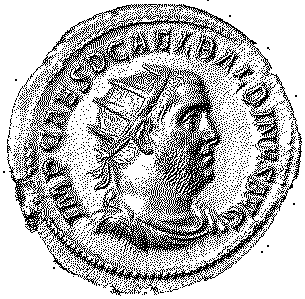
A COIN FROM THE REIGN OF BALBINUS
|
|
How about a BELBIN Roman Emperor? During the First Roman Empire, which spanned the 310 year period from 27 BC to 284 AD, it seems that a certain Decimus Caelius Calvinus BALBINUS (born in approximately 170 AD) was one of six Emperors in the year 238 AD which was just a few decades short of the fall of Rome. He was elected joint Emperor on 22 April 238 although he was extremely unpopular with the people of Rome and he and his joint Emperor Pupienus were also suspicious of each other. The situation only lasted 99 days when BALBINUS was dragged naked through the streets of Rome, tortured and then murdered. There are various websites depicting this history including Rome & Romania 27BC to 1453AD and The Free Dictionary from where some of this information comes. Decimus Caelius Calvinus BALBINUS doesn't seem to have left any evidence of having any descendants though, so any claim he might have been a source of the name can only be something to speculate on.
|
FRA . AUGER DE BALBEN - Grand Master of The Knights Templar, c.1160 - 1162 AD
|
A handwritten note found amongst the papers of the late Edward George Craven BELBIN (born 1879) read:
"Auger De Balben, Dauphiny, France. Grand Master of Knight Templars 1161 and died about 3 years later".
I suspect that Edward George Craven BELBIN must have considered there was a BELBIN connection to have written this at all. There are many books, not to mention websites devoted to the history of the Crusades and the Order of St. John of Jerusalem, but if you only want BelbinMania's potted version, then read on.
In summary, the origins of the Order of St John go back to about the year 330 AD when Helena, Empress and mother of the Emperor Constantine, set out to discover Calvary and to find all the relics of the passion. After the location was found, the Emperor Constantine, built the Church of the Holy Sepulcher on the site, following which a steady stream of pilgrims sought to visit the place of our Lord's earthly life. These pilgrimages continued during many hundreds of years, but by the beginning of 700 AD, many ancient centres of Christianity had fallen to Islam, including Alexandria, Antioch and Jerusalem.
|
|
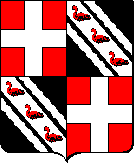
The Arms of
Fra Auger de Balben
(AD 1160-1162) an elderly Frenchman from the Dauphin
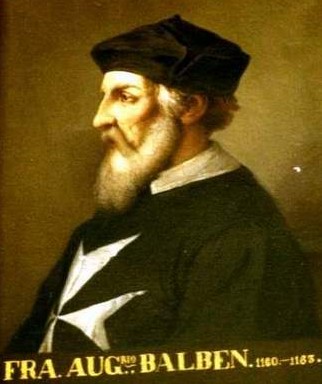
|
|
The First Crusade began in 1095 to free Palestine and succeeded on 11th November 1100 when the new Christian Kingdom of Jerusalem was proclaimed. This is where it gets interesting as in about 1070, before the conquest of Jerusalem by the Crusaders, a Hostel for Pilgrims dedicated to St. John the Almsgiver (later St. John the Baptist) was founded by Benedictine Monks and was run by brothers independent of the Benedictines from that time on, who were known as the 'Hospitallers'. The Papacy, in 1113 recognized the Hospitallers of Saint-John as a monastic order, and when the first Administrator (later known as Grand Master) of the Order, Peter Gerard died in 1118, his successor the Frenchman Raymond de Puy changed the Order from basically pacific in purpose into armed guards, and soon into fighting monks, participating alongside the Crusaders keeping the road to Jerusalem free from bandits and holding fortresses as well as hospices across the Holy Land. The Order became known as 'The Poor Knights of Christ and of the Temple of Solomon', referred to as the 'Poor Knights' or the Templars and became independent of the Benedictines. Raymond de Puy followed the example of the Poor Knights, and a military arm was grafted onto the Hospitallers. After Raymond's death the Order was, according to some histories, headed by Fra Auger de BALBEN between 1160 and 1162, who was apparently like his successor, an elderly Frenchman from the Dauphin.
Is this sufficient for BELBINS to lay claim to the fact that an early form of the name was in use in France in the 12th Century?
|
A GAELIC NAME
Martyn G D BELBEN of Ft. Lauderdale, Florida has suggested that the name BELBEN may have Scottish origins being Gaelic for Church atop a Hill. This story was repeated by his father and grandfather before him.
AN OLD ENGLISH NAME - Records point to Colber, Dorset
|
The oldest recorded birth found so far is that of Margaret De Colbarne BELBAN in 1250 at Hatton, Cheshire, England. This single birth is 300 years earlier than most of the oldest records in BELBIN history and is curiously isolated in its location since most Belbins in later centuries are primarily found in Southern England.
Earlier, in 1203, or so it is understood, a Coat of Arms was apparently in use and perhaps may have had a connection with that De Colbarne BELBAN family. For what it is worth an illustration of the arms is shown here, but for now, the ownership remains unknown. The translation of the Arms is that Sable (black) denotes Honesty and Argent (white) denotes Peace. As you will see, the arms shown do not exactly match that translation, but interestingly, John BELBIN of Nova Scotia says that he has a similar copy Coat of Arms where the cross is white on a black background, so it would seem John's copy is a truer version to the literal translation.
One unproven source, namely the so-called Surnames Database suggests that BELBIN is a name of Anglo-Saxon origin, and is in fact an English locational surname from a place which now no longer exists because it was possibly one of those villages or hamlets which were forcibly cleared during the 14th Century, either to make way for sheep pastures, or because of natural disasters like the Black Death of 1348 which caused abandonment of once thriving settlements. It is suggested that the placename meant the place of the funeral pyre of the Binningas. Apparantly, in pre 7th Century old English, the word BEL meant a funeral pyre (or beacon), and BINNA was a personal name and also the name of an old English clan. Unfortunately, the Surnames Database does not go on to expand on what its sources were for such a definitive explanation of the origin of the BELBIN name.
The earliest BELBIN found in Dorset records is Walter BAILLEBYN in the Lay Subsidy Roll of 1327. He was assessed for 6d. tax in the "Decenna of Colbere in the Hundred of Boclonde Nyeutone" which was roughly the Hundred of Sturminster Newton Castle later on. Curious that we have a Margaret De Colbarne Belban and the Decenna of Colbere. A link there, surely?
|
Click for the records of STURMINSTER NEWTON
|
|
During the 16th century, BALBYNS were paying taxes and one, George BELBYN was noted in 1569 in a Tudor Muster Roll - all of these are of Sturminster Newton. Belbins were still in Colber in the first half of the 18th century according to the Lay Subsidy and Muster Rolls in Dorset County Record Office.
|
|
|
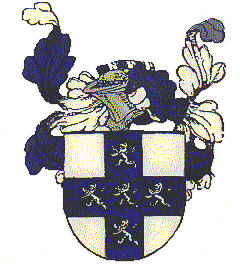
BELBIN Coat of Arms c.1203
Sable, on a cross argent, five lions rampant of the first
|
The lists of the 1641-42 Protestations and Hearth Tax Roll of 1662-1664 of Sturminster Newton include Belbins and they were noted as Royalists during the Civil War and Commonwealth; one, Robert BELBIN was examined by authorities in 1649 with the penalty of losing his estate if proved "delinquent" against Parliament.
A FRENCH OR SPANISH NAME
Barbara Lamble, in her work The Pitts of Dorset and Richmond N.S.W., says that the name BELBIN is not considered in any dictionary of names and in searching for an origin she looked at the Duchess of Cleveland's Battle Abbey Roll of the Norman Conquest (which is supposed to have been a list of William The Conqueror's companions preserved at Battle Abbey on the site of his victory over Harold) with regard to sobriquets or nicknames in which the Normans delighted. The Roll contains many instances of them and they abound in the Magni Rotuli Scaccariae Normannae as well as in our own official records of the twelfth century. Included in the list given by the Duchess is BAILLABIEN and Barbara concludes that this would appear to be a very logical early form of the name.
Another nickname idea is that BELBIN is derived from the French name BALBON which in turn has it's origins in the old French term baube meaning stammer or stutter. Richard BELBIN reports that he was on holiday in France in the 1970's and whilst there a farmer's wife informed him that the name was French - pronounced BELBAN with an almost silent 'N'.
Jon BELBIN of Kent, England informs us that he had once been told that BELLEBIEN originated in France and was a common Huguenot name. During the 16th Century persecutions many Huguenots sought relief and religious asylum in Southern England. It certainly appears, however, that the recorded use of the name in England pre-dates the Huguenots.
However, there's a name in Catalonia in Spain which is written BILBENY (the first syllable pronounced bill and the last in rhyme with champagne, i.e. bill+bagne). In Catalan and Spanish B and V have exactly the same sound, B. Also, French is spoken in Catalonia, and those who research the surname VILVEN consider that the variation VILVAINE and BILBENY are two different spellings of the same name. As thousands of French families came to northern Catalonia between 1550 and 1700 a good number of Catalan surnames are French. This helps support the theory that the BELBIN name may have originated in France.
|
Linda BELBEN's late father, Russell Henry BELBEN who died in 1999 apparently used to say that his family surname was originally spelt BELBENOIT or BELBINOIT and that it was a Spanish name, not French. Unfortunately, it is not known why Russell BELBEN thought that to be the case, but perhaps it could have been another variant from Catalonia.
Out of interest, the French penal colony in Guiana known as Devil's Island had a very famous escapee named Rene BELBENOIT who arrived there in 1922 and fled in 1935 after four unsuccessful escape attempts. He reached Trinidad and Colombia having stowed away on a US freighter. He had originally been sentenced to eight years for stealing from a Countess he served as a valet. During his imprisonment he kept a diary and in 1938 published a book Dry Guillotine which appeared in 10 languages and which had a role to play when public opinion caused France to close its infamous prison colony in 1953. When BELBENOIT reached the United States 22 months after his escape he was sentenced to 15 months for illegal entry to the country. Later in 1958 he became an American citizen.
|
|
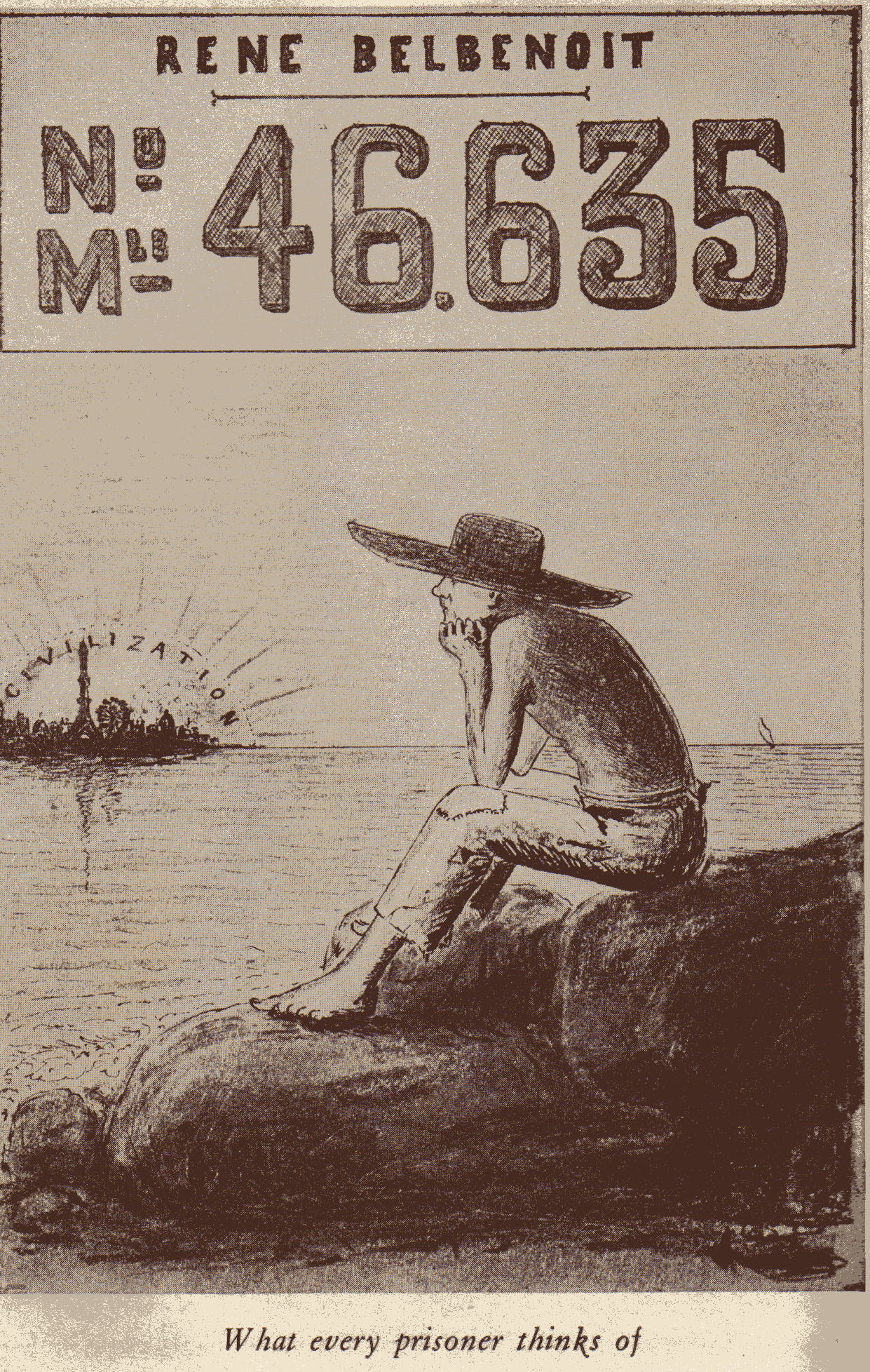 |
In an article written by J.E. Calder and published in three instalments in the Hobart Mercury newspaper on 2nd, 8th and 9th April 1880 was a narrative interview with so called living almanac James BELBIN, the son of James BELBIN (1771-1848) The Emancipist. This article stated that the family was of German origin, but unfortunately, J.E. Calder did not expand on the statement, so we are none the wiser. The article is reproduced in full and if you want a long, but interesting read, then click here.
Additionally, a suggestion once made was that the German town of BELLEBEN could be a possible place of origin. There is an interesting website about this place which may reveal clues - but you need to read German!
|
Herr Volker Lange, the webmaster of the BELLEBEN website wrote in an e-mail to BelbinMania's intrepid American researcher Ed BELBIN that the name BELLEBEN, as well as all names the with suffix leben, indicates that they were founded by medieval German tribes. He also added, as a point of interest that the tribe of anglos settled in an area between the city of Schonen in southern Norway and the Thuringia mountains in Germany in the 5th century. Later on, the anglos went to Britain and founded the English Kingdom.
|
|

|
The suffix leben has a similar meaning to heritage of a chief. It comes from the old German word leve meaning heritage. The village of BELLEBEN is named as BENLEVE in ancient books and accordingly the name BENALEVE could be the heritage of a chief BENNO who therefore could presumably have been the founder or conqueror of BELLEBEN village.
|
|
As an aside, it was noted that in the German telephone directory for 2000 there was no-one listed by the name of BELLEBEN but Linda BELBEN said that there was one BELBIN in Berlin and also a BELBEN family in Dellfield, but then these could easily be people who have moved to Germany in recent times. In the region of Stuttgart there are some families with the name BELLEBAUM, BELLEDIN and BELLEBNA, which may, or may not, be a variation of the BELBIN name.
In December 1998 Ray BELBIN advised that he met a University Dean in Queensland, Australia who was of Polish descent and who immediately recognised the name BELBIN or BALBON as a very common Russian name. Richard BELBIN also tells us that he met a Russian who claimed it was a Russian name pronounced WOLBIN.
Meanwhile, Dushan Savic of Serbia says that the BELBIN name is very similar to the Serbian name BALABAN or BALABANOVIC (meaning of Balaban). The BALABONOV website suggests that an origin for the names BALABAN, BALABANOV, BALABANOFF and BALABANOVICH may be found in the Kazakh mountains of Kazakhstan where there is an eagle called the BALABAN and speculates if the name was taken by the Persians some 4000 years ago when they began to use the term BALABANS to describe the three leading soldiers of a battalion. Also suggested, is that Turks may have taken the use of this name to describe reatively tall non-muslim men from their territories. Wikipedia tells us that BALABAN and its variants are common last names in Russia, Ukraine, Bulgaria and Serbia.
Marie-Louise Paulesc tells us that BALABAN is a also very common family name in Romania and that it means eagle.
AN ANCIENT PERSIAN NAME
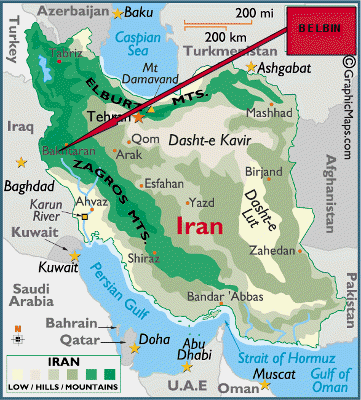 |
|
As mentioned above, the BALABONOV website speculates that the name may have been taken by the Persians some 4,000 years ago when they began to use the term BALABANS to describe the three leading soldiers of a battalion. For centuries the land which now forms the modern state of The Islamic Republic of Iran was of course known as Persia, as it was not until 1935 that Iran came into being. The Iranian dynasties can in fact be traced right back to 3,000 BC and the BALABAN name and its derivatives were apparantly in use in that region for much of that period, so it is a truly ancient name.
It seems that in modern day Iran in the Governorate or Province of Ilam (Ostan-e Ilam) which is a border province in the west of the country only some sixty miles due east of Baghdad in Iraq, that there is a populated area some 1,265 metres high in the mountainous terrain of the Zagros Mountains known as BELBIN. The geographical co-ordinates are 33° 32' 25" North: 46° 27' 9" East and the native language is Farsi.
How this remote mountain hamlet can conceivably be connected with the rest of us BELBINS is just a complete mystery. Clearly, the odds must be that it is named after the BALABANS of ancient Persia rather than having any type of link with 16th Century English Folk from Dorset but finding useful information, bearing in mind the political extremes of Iran in the 21st Century, is most likely impossible.
There are some links below which reveal something of this place just in case these are of interest:
|
CONCLUSION, so far....
If you have read right through this page you'll understand why it is not particularly easy to form any reasonable conclusion about how the name BELBIN may have originated, and by the same token, how easy it may be to jump to ill-founded conclusions. The only conclusion that can perhaps be made is that there is enough available evidence to suggest that variations of the name or names which are similar in sound or pronunciation as the modern day names of BELBIN and BELBEN did exist a very long time ago, and may somehow be connected with those of us who have carried the name for the last five centuries or so in Southern England.
One final thought. If you come across anything which can build on this research, you will be doing all BELBINS a favour if you choose to share it on this page.
|
Any ideas about the origin of the BELBIN name? Share them please.

|
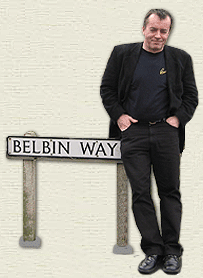
|
|


